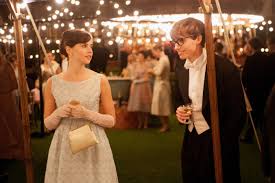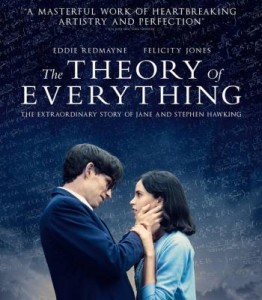 “The Theory of Everything” is a film of many dimensions, a love story, a history lesson, a biography, an education in medicine and physics and an incredible true tale of triumph over physical limitations caused by a debilitating disease.
“The Theory of Everything” is a film of many dimensions, a love story, a history lesson, a biography, an education in medicine and physics and an incredible true tale of triumph over physical limitations caused by a debilitating disease.
With five Academy Award nominations, including Best Picture, and Golden Globe and Screen Actors Guild trophies for Eddie Redmayne, who stars opposite Felicity Jones, it tells the personal story of renowned physicist Stephen Hawking, beginning in the 1960s when he was a brilliant Cambridge University student who falls in love with Jane Wilde, who became his wife.
Based on Jane Hawking’s book about their marriage, and taking its title from a 2002 book about time, space and the universe by Professor Hawking, the Focus Features film is directed by James Marsh with a screenplay by Anthony McCarten, also one of its producers, who spent eight years bringing it to the screen.
McCarten and co-producer Lisa Bruce sat down recently to discuss the extraordinary and compelling story behind “The Theory of Everything.” Here is an edited version of our conversation:
Hillary Atkin: Tell me about the genesis of the project and how it progressed.
Anthony McCarten: First off, I was in awe of Stephen Hawking and his ideas. I read Jane Hawking’s book in 2004 and had Eureka moments. I could see the story and jumped on the train–became a crazy person–and begged her for the rights. It may be a measure of my charm, but it took 8 years, and we began a conversation that went on for 8 years. It was a long, slow process. It’s a scary thing to have a movie made of your life.
I teamed with Lisa Bruce in 2009, and Jane decided in 2012. With James Marsh directing and once we were cast, I reached out to Professor Hawking, so he knew the caliber of the cast and director. He wasn’t wild about it and he was obviously concerned. To have the blessing of both parties is ideal. We would have made the film anyway but the reception would have been different.
Lisa Bruce: Stephen had said he wasn’t interested in a movie that looked at his personal life. But obviously that gave us a unique insight into his story, and Anthony had balanced the screenplay. Jane was pushing to have the movie as honest and frank as possible. Other companies we approached suggested ending the story when they were happily married. Luckily Working Title had no such inclination, and they appreciated the more messy elements of a marriage–to go all the way through the separation, to have a unique adult love story.
It wasn’t hard to get financing. The initial script was quite moving, but we had time to tease out the love story and emotional things. What took so long in the journey was coming to terms with her life, which was exposed for the world to see. Even though it was in her book, her book wasn’t internationally read. We focus on how inspirational their commitment to each other was, and it made her realize it would be very valuable.
HA: What were the biggest obstacles in making the film?
LB: One of the biggest challenges is that it covered about 28 years, and it was quite a challenge to have the audience present in the moment while traveling so much in time. We very much wanted the costumes and design to be seamless instead of marking the time in dramatic fashion. We aimed at avoiding having to subtitle with dates. We never wanted to say, “Five years later.” We wanted it to feel very natural.
AM: I had to do justice to a one of a kind love story. Without being some kind of theoretical physicist, I had to find ways to make the concepts entertaining and cinematic as well as to dramatize the brutal nature of ALS and the effect. There were multiple challenges across the board, like distilling 27 years of marriage and decoding the personal life, through Jane’s book. When you go into the intricacies of personal life, you’re relying on inspired speculation. I wasn’t privy to these conversations. That’s one of the more delicate, tricky areas, where you’re putting words into the mouths of people when you weren’t there. You hope you get it right.
LB: Like any true story, we had to compress time, and what was important to us was to get the most important elements. ‘”You realize how short your life is when you cut out all the boring parts,” Hitchcock said. Their lives are so extraordinary, their love life so extraordinary. She went into a journey with the cloud of him having two years to live. So to go on living for 50 years, and have three children, to be a mother to them and to Stephen—and to also bring Jonathan’s story into it really was poignant and important. It was very key for us to show the scientific accomplishments while pulling the curtain on the personal life, which was something people hadn’t seen.
HA: Obviously it adds layers of complexity when you’re dealing with real people’s real lives.
AM: One of the big lessons when you’re working with actual people and events is the work has to be in service to the truth. You can make the mistake of inventing too much, or too little. For the subjects of a biography, you do them no favors if the film is dull and unwatchable, but distorting the truth has to be avoided even if you feel it will make it more exciting and marketable. Playing too fast and loose with the veracity of the overall story always backfires. Everyone can Google the facts.
I have to find big moments within the tolerances of history. You have to dig down into character, rather than the superficial moving of chairs.
Jane became a friend, but there was always a question, without Stephen’s permission, the whole project would lack a moral authority. It was incumbent on me to meet the great man and get his blessing. He agreed only if he could read script first. I had no idea what his reaction would be. He made a few alterations, and we combined the characters of a few friends. After that, he visited the set, and he’s now walking the red carpet and it’s been an unexpected joy. It can’t be fun for him to watch, it’s warts and all. It’s about the man and his bravery, but he’s embraced it. No one’s life is perfect.
LB: When he saw the film, he said he was even more pleasantly surprised. Because it was his ex-wife’s point of view. Stephen was very emotional. He cried, and then offered us his actual electronic voice. People think it’s generic, but it’s patented and copyright, it’s got a different cadence. When we sent him all the lines, he recorded them, and our editor had to rejigger. All the lines prior to that were Eddie’s.
It’s like Stephen was hugging us. Obviously the computerized voice gave the film a veracity that we didn’t have quite prior to that. It was him saying, I appreciate it, because it deals with difficult things, Jane and Stephen.
HA: What was the production like for Eddie and Felicity?
LB: Many other companies wanted big names which seemed antithetical to what we had. Working Title was able to support creative casting. For Eddie and Felicity, it was the perfect moment in their careers. They hit it out of the park, and they had freedom, yet there was tons of pressure playing real people. They had great mutual respect for each other and had similar training. They brought chemistry to the roles, and they love and respect each other.
HA: What did you take away from the experience?
LB: I think my perspective on time has changed. Stephen’s ability to face a death sentence and to have an incredible belief to make a mark on the world, like I’m going to do something amazing and profound in the time I have. The film is about time. I honor each day I can walk this earth. The ability to live life to the fullest, even in a wheelchair, to smile and have an incredible wit and be really happy to be alive. It was really emotional–two people who walked a path with grace and optimism. They’re quite my heroes.
HA: What reaction did you receive from them?
AM: You hope when the subjects see it they’ll endorse it. Both declared it broadly true and a surprising honest portrayal of their marriage. From this I take great pride. When I first met Jane, I made clear I wanted script control. Her book was unflinching, I didn’t feel pressure to change things. The pressure you feel is to do it justice, as it’s a tale of extraordinary personal heroism, and to capture it and render it powerful to the audience. You’re not having to champion a fictional character in the same way.
A lot of their colleagues were very moved, and Stephen and Jane were moved by the reaction of friends. Their children have been effusive on how authentic we captured their lives, with the same tablecloths and dining suites they used. Their daughter Lucy wept throughout viewing the film and sent an effusive thank you, unanimously giving the family’s support.


